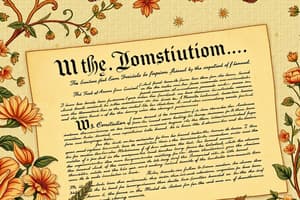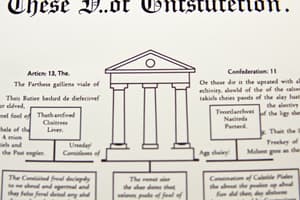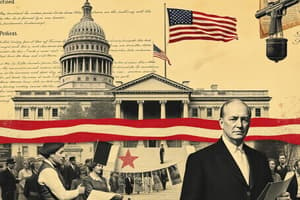Podcast
Questions and Answers
Under the Articles of Confederation, Congress had the power to:
Under the Articles of Confederation, Congress had the power to:
- To amend the Articles of Confederation
- To levy taxes
- To enforce laws
- Regulate trade (correct)
The first formal constitution in the colonies was the:
The first formal constitution in the colonies was the:
- Fundamental Orders of Connecticut
- Articles of Confederation (correct)
- Northwest Ordinance
- Bill of Rights
This man was known as the father of the Constitution:
This man was known as the father of the Constitution:
- George Washington
- John Adams
- James Madison (correct)
- Thomas Jefferson
Federalists were concerned that without a strong national government this would triumph:
Federalists were concerned that without a strong national government this would triumph:
As established by the Framers, the voice of the people would be represented in the:
As established by the Framers, the voice of the people would be represented in the:
Article 1, Section 8, of the Constitution lists specific powers granted to Congress, known as:
Article 1, Section 8, of the Constitution lists specific powers granted to Congress, known as:
To protect liberty and specify its powers, the Framers gave Congress:
To protect liberty and specify its powers, the Framers gave Congress:
An amendment may be proposed by a two-thirds vote of both houses of Congress or by:
An amendment may be proposed by a two-thirds vote of both houses of Congress or by:
The Constitution grants these powers to the national government:
The Constitution grants these powers to the national government:
This gives the federal government the right to tax your income:
This gives the federal government the right to tax your income:
In Congress, the majority and minority leaders are assisted by:
In Congress, the majority and minority leaders are assisted by:
In the Senate, bills are brought to the floor by:
In the Senate, bills are brought to the floor by:
The process of setting up new congressional districts after reapportionment is called:
The process of setting up new congressional districts after reapportionment is called:
The presiding officer of the House of Representatives is the:
The presiding officer of the House of Representatives is the:
A filibuster can be stopped when three-fifths of the Senate votes for:
A filibuster can be stopped when three-fifths of the Senate votes for:
The power to write the rules in Congress is controlled by the:
The power to write the rules in Congress is controlled by the:
This power allows Congress to check on how the executive branch is administering the law:
This power allows Congress to check on how the executive branch is administering the law:
This action was found unconstitutional because it violated the separation of powers:
This action was found unconstitutional because it violated the separation of powers:
What requires the president to notify Congress when committing military forces?
What requires the president to notify Congress when committing military forces?
Following the vice president, the next in succession for the presidency is the:
Following the vice president, the next in succession for the presidency is the:
What of the following is a requirement to become president?
What of the following is a requirement to become president?
This deals with presidential succession:
This deals with presidential succession:
This person presides over the Senate:
This person presides over the Senate:
A bicameral legislature is one that:
A bicameral legislature is one that:
Study Notes
Articles of Confederation and Constitution
- Congress under the Articles lacked the power to levy taxes but could regulate trade.
- The Articles of Confederation were the first formal constitution adopted in the colonies.
- James Madison is recognized as the "Father of the Constitution" for his pivotal role in its drafting.
Federalists and Government Structure
- Federalists feared that without a strong national government, anarchy would prevail.
- The House of Representatives was established to ensure the voice of the people in governance.
Powers of Congress
- Article 1, Section 8 of the Constitution enumerates specific powers granted to Congress, termed as enumerated powers.
- Congress has expressed powers to protect liberty and define its functions.
- Delegated powers are specifically granted to the national government.
Amendments and Taxation
- Amendments can be proposed either by a two-thirds vote in both houses or through a national constitutional convention.
- The Sixteenth Amendment allows the federal government to tax income.
Leadership in Congress
- Whips assist majority and minority leaders in Congress with organization and party discipline.
- In the Senate, bills proceed to the floor via unanimous consent.
Redistricting and Leadership Roles
- The process of redistricting occurs after reapportionment to establish new congressional districts.
- The Speaker of the House presides over the House of Representatives and manages legislative procedures.
Filibusters and Legislative Control
- A filibuster can be halted through cloture, requiring a three-fifths vote in the Senate.
- The majority party has the power to establish legislative rules within Congress.
Executive Oversight
- Legislative oversight allows Congress to monitor the executive branch's law administration.
- The legislative veto was deemed unconstitutional for violating the principle of separation of powers.
Military and Presidential Powers
- The War Powers Act mandates presidential notification to Congress when deploying military forces.
- The Speaker of the House is next in line for presidential succession after the vice president.
Requirements for Presidency and Succession
- A native-born citizen is a requirement to become president of the United States.
- The 25th Amendment outlines procedures for presidential succession.
- The vice president presides over the Senate, following the established constitutional role.
Legislative Structure
- A bicameral legislature consists of two separate chambers, often referring to the structure of Congress.
Studying That Suits You
Use AI to generate personalized quizzes and flashcards to suit your learning preferences.
Description
Test your knowledge of the Articles of Confederation and the U.S. Constitution. Explore key concepts such as the powers of Congress, the role of Federalists, and the amendment process. Ideal for those studying American government and its foundational documents.




